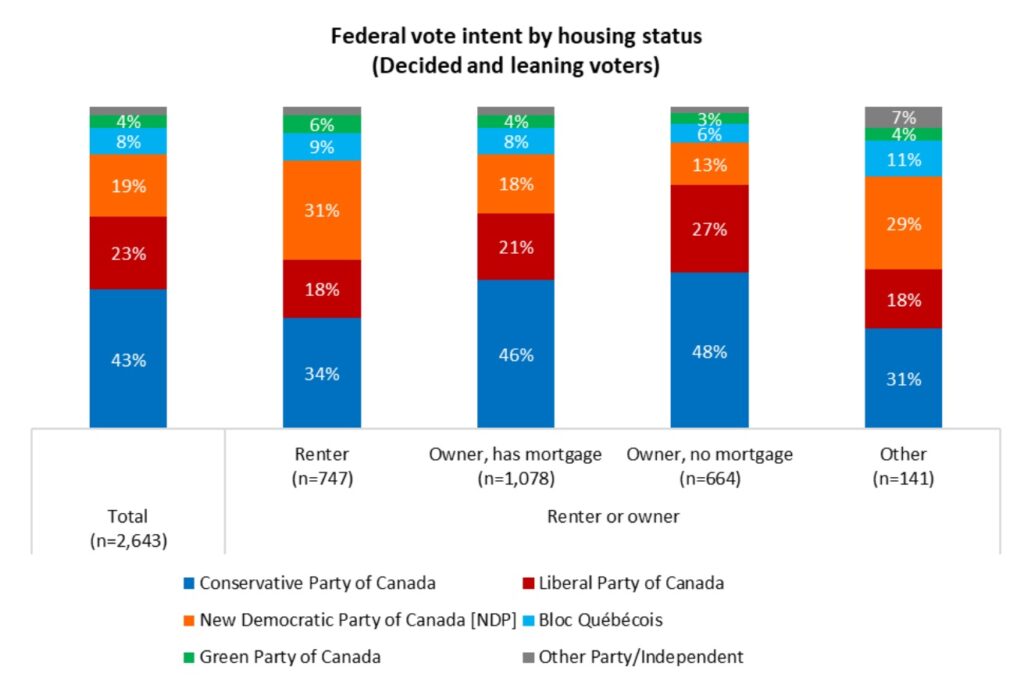According to new research from Angus Reid Institute (ARI), Canadian renters are more likely to vote for the Conservative Party if a federal election were to happen today. This follows months of concerted effort by Prime Minister Trudeau, his cabinet and caucus, to drum up support for the new measures announced in the 2024 federal budget that promise to “restore generational fairness for renters” and “make life more affordable for Canadians.”
The poll, conducted online from April 19 to the 23rd, found that the Conservatives are currently leading the Liberals by a margin of nearly two-to-one (43 per cent versus 23 per cent) while the NDP are a not-too-distant third at 19 per cent. Among Gen Z and Millennial voters, the Liberals are a strong third; meanwhile, 34 per cent of renters say they are more likely to vote for the Conservatives or the NDP (31%) over the Liberal Party (18%) in an upcoming election.
“With the slew of new measures intended to support renters and improve affordability, it is surprising that the Liberals are now the third choice among younger Canadians,” said Jon Roe, Research Associate with ARI. “We’ve done some surveying around the concern over the deficit, government spending and its impact on inflation, and this does play a role in why they are wary of voting for the Liberals. But we also found that Canadians just don’t believe the new measures will work.”
Released in mid-April, the 2024 federal budget includes $8.5 billion in financial supports and programs intended to spur affordable housing development. It also includes the Tenant Protection Fund, which introduces new measures and a code of conduct to prevent landlords from unfairly hiking rents.
For those currently renting but looking to buy a home, the plan offers a 30-year amortization period for insured mortgages on new construction—which isn’t enough, according to the Residential Construction Council of Ontario (RESCON).
“We commend the federal government for seriously trying,” said Richard Lyall, RESCON president. “There are positive measures here to assist purpose-built rental housing supply. That much is encouraging. But there is no relief for first-time buyers who have been pushed out of the market. They are being taxed on new housing at rates which would have crushed their parents and grandparents. Why are we doing that to them?”
 Long-term outlook
Long-term outlook
Housing affordability aside, the big picture issue is that the federal budget forecasts a nearly $40-billion deficit for the next fiscal year—a worrisome reality for all Canadians, and particularly younger cohorts. As per the poll’s findings, 56 per cent say their outlook for Canada’s economy has grown more negative in the wake of the budget, and only 9 per cent say they believe the new measures will bring about financial relief or stability for them personally.
But that’s not to say each individual measure was perceived negatively. As Roe pointed out, 68 per cent of Canadians say they support the government’s plan to lease out federally owned lands for the construction of affordable housing and 65 per cent say they approve of funding infrastructure for new housing developments.
“The problem lies with the budget as a whole and fears that the changes could have a detrimental effect on Canada’s economy,” he said. “Nearly half of Canadians (47%) are more pessimistic about the future of their personal financial situation now than they were previously.”
As for rental housing providers, the ARI poll didn’t address them specifically, but both the Federation of Rental-Housing Providers of Ontario (FRPO) and the Canadian Federation of Apartment Associations (CFAA) have issued statements calling the new measures “encouraging” for future purpose-built rental developments.
“Budget 2024 takes significant steps to support housing growth from coast to coast to coast,” CFAA interim president, Tony Irwin said. “CFAA welcomes the government’s continued commitment to address our national housing shortage through continued funding and policy changes.”
Also noteworthy is that while nearly half of Canadian homeowners (with and without mortgages) say they would vote for the Conservatives in an upcoming election, 27 per cent of homeowners with no mortgage say they would support the Liberals—the largest cohort among the groups surveyed.
More key findings:
- Conservative leader Pierre Poilievre is viewed more positively among Gen Z adults than Trudeau (29% vs 17%). He also has a higher favourability among younger (35% vs. 27%) and older (39% vs. 27%) Millennials.
- Half (49%) of Canadians say their opinion of the prime minister has worsened, while a handful (5%) say it has improved in recent weeks.
- Since the budget, the Conservatives are ahead of the Liberals in every region in the country, but the Liberals garner the most support in Atlantic Canada.
- Half (50%) believe increasing the capital gains inclusion rate is a “good idea” because “wealthy Canadians do not pay their fair share of taxes.” One-third (34%) disagree, saying “taxing capital gains hurts economic growth”.
Survey methodology:
The Angus Reid Institute conducted the online survey from April 19-23, 2024, among a representative randomized sample of 3,015 Canadian adults. The survey was self-commissioned and paid for by ARI.
For detailed results by vote intent, renters and owners, and other cross tabulations, click here. For detailed results by age, gender, region, education, and other demographics, click here.





